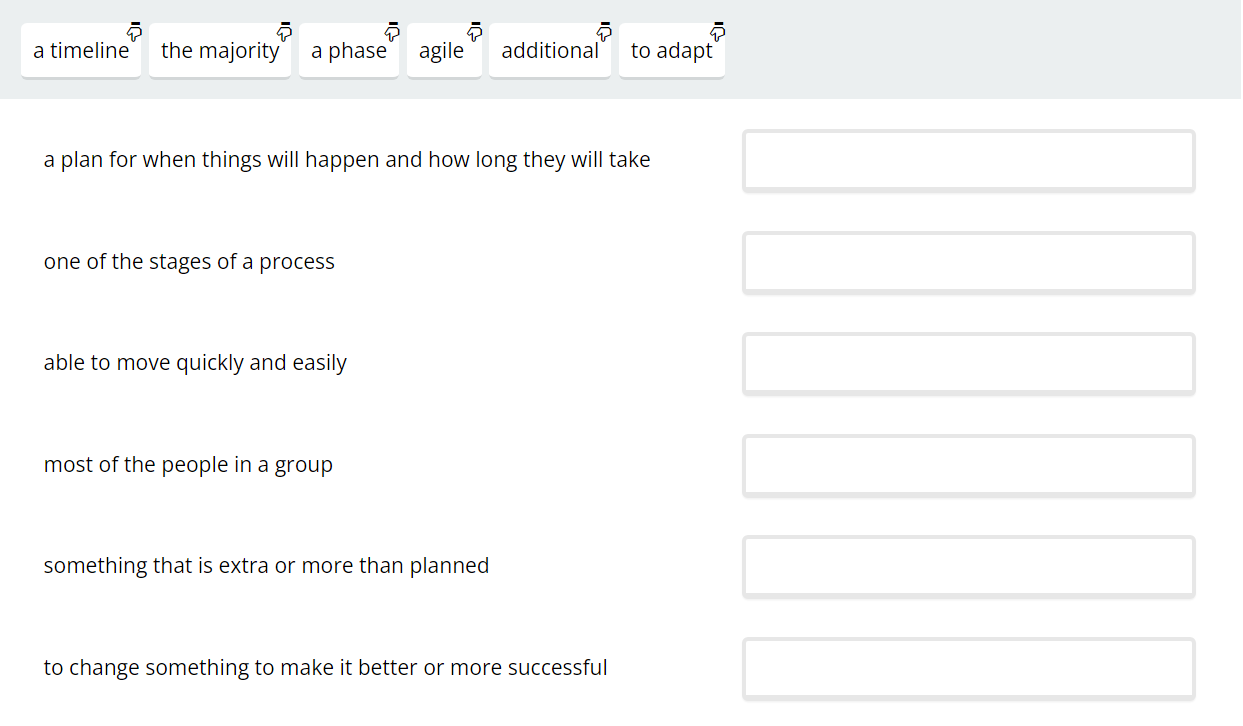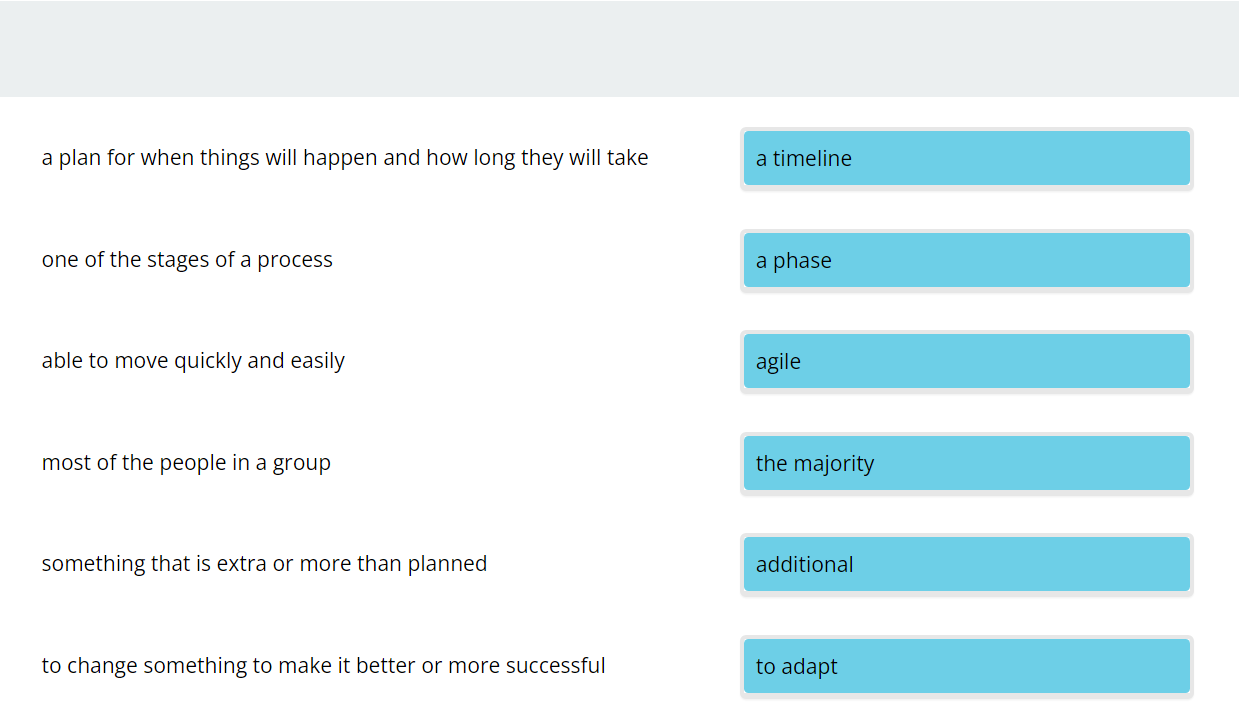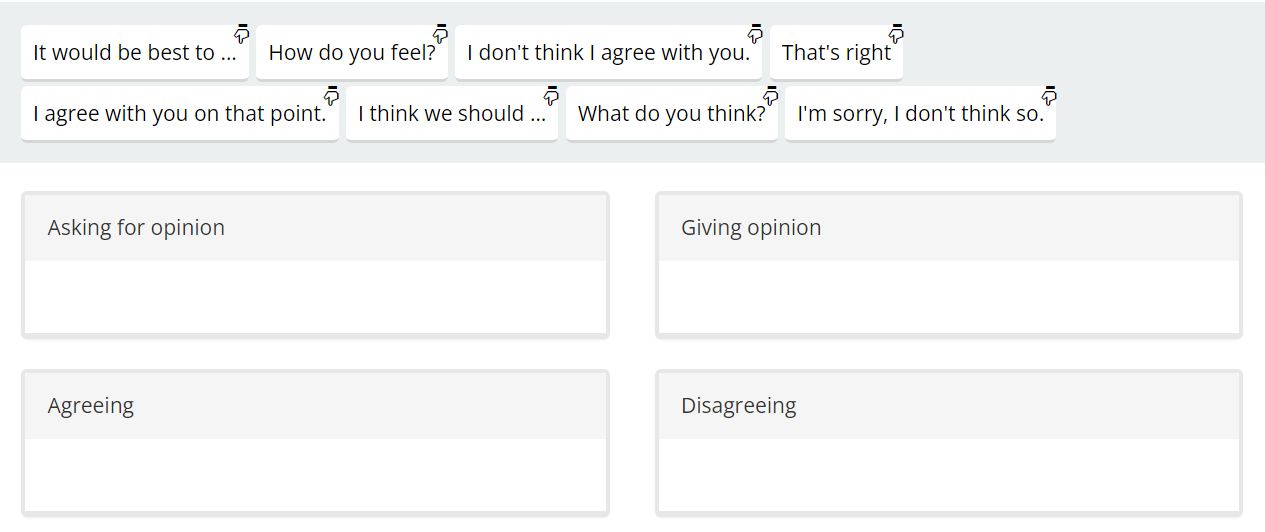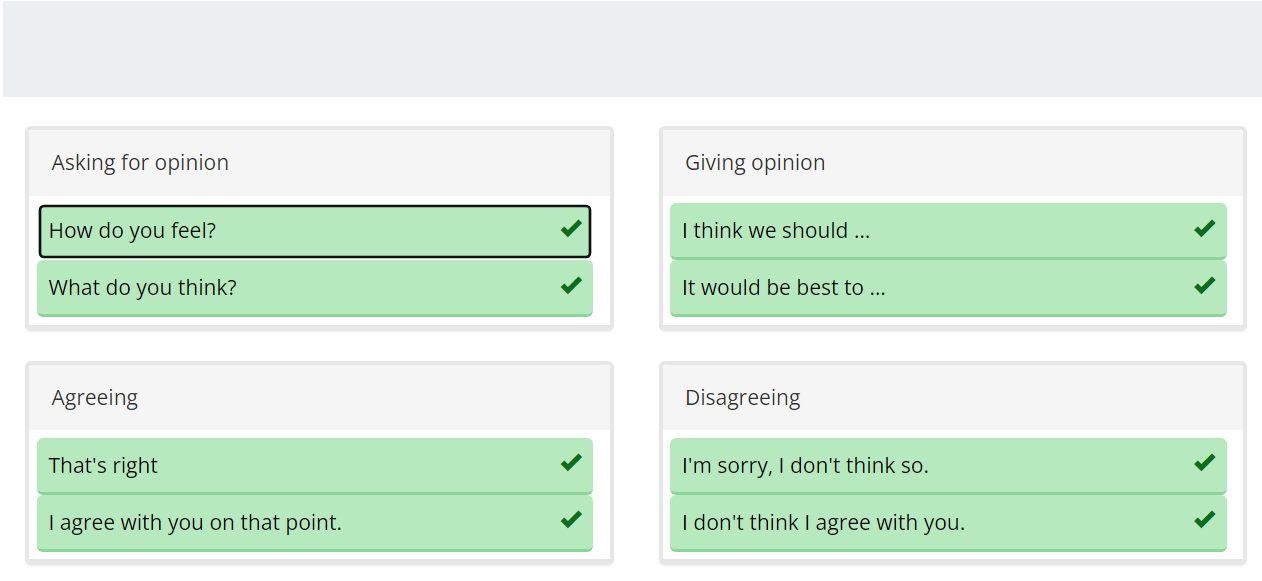【B1-Listening】10 Making a decision-做出决定
【B1-Listening】10 Making a decision-做出决定

Listen to a meeting in which colleagues make a decision to practise and improve your listening skills.听一次会议,同事们在会议上做出了练习和提高听力技巧的决定。
Do the preparation task first. Then listen to the audio and do the exercises.先做好准备工作。然后听音频并做练习。
A weather forecast – preparation
Match the words with the definitions.
- Question
Vocabulary
1.throughout
2.isolated
3.a patch
4.drizzle
5.to clear up
6.elsewhere
7.a heatwave
8.to make way for
Definition
a. a small area
b. to disappear
c. on its own, without other similar things around it
d. during all of a period of time
e. in other places
f. to move so that there is space for something to enter
g. very light rain
h. a period of weather that is much hotter than normal

- Answer
1.a small area – a patch
2.to disappear – to clear up
3.on its own, without other similar things around it – isolated
4.during all of a period of time – throughout
5.in other places – elsewhere
6.to move so that there is space for something to enter – to make way for
7.very light rain – drizzle
8.a period of weather that is much hotter than normal – a heatwave
TODO

Transcript
English
Jani: Thanks for coming, everyone. So, we’re here today to define the timeline for our new project.
Emiko: Yes, Jani, that’s a great idea.
Carolina: OK. What do you need from us?
Emiko: Hold on a moment. I think we need to decide between us what to do, to make sure it works for all departments.
Jani: Yes, exactly, don’t worry. We’re going to discuss this and make a decision together. Let’s first think about the scheduling of each project phase. What do you think, Emiko?
David: Can I interrupt? I think we should first be clear about the process we’ll use to make the decision. How are we going to do it?
Jani: Ah, yes. Good point. Well, I think the best way is for each of you to give your opinion and then we can discuss and make a decision.
David: OK. That sounds good.
Emiko: Yes, that works for me too. I know we’re still planning the structure of the later phases of the project, but I think we should begin phase one as soon as possible. We can work out the rest later, as we go along.
David: I’m sorry, I don’t think so. How can we start phase one if we’re not fully clear on where the rest of the project will take us? We might make a wrong decision and waste time.
Jani: I agree with you on that point, David. However, we’ll waste too much time if we wait until everything is planned before we actually start working on the project. I think we should take an agile approach.
David: Agile approach?
Jani: Well, it means that we start quickly and then adapt as we go along.
Emiko: That’s right.
Jani: Carolina, you’ve been very quiet.
Carolina: Um … I’m sorry. I didn’t want to interrupt. I’m listening … and thinking.
David: Do you agree we should get the plan right first, and then start with phase one?
Carolina: I’m sorry, David. I don’t think I agree with you. It’s important to have a good plan. But plans can change, even the good ones – and business changes often. We need to be flexible, and we also need to move quickly.
Jani: OK. So should we take a vote?
Emiko: Well, you’re the project leader. Let’s go with your decision.
Carolina: Yes, I’ll follow your lead, Jani.
David: Well, I guess that’s decided then. We’ll follow your agile approach, Jani. Start quickly and keep planning the later stages of the project.
Jani: Yes, that’s right.
David: I still don’t think this is the right decision, but I’m happy to go with the majority. We should add some space into the schedule later for additional work this ‘flexibility’ will need.
Jani: Don’t worry, David, we will. OK, so it’s decided then. We’ll start phase one as soon as possible, and in the background we’ll continue planning the later phases and adapt them as we go along.
English-Chinese
Jani: Thanks for coming, everyone. So, we’re here today to define the timeline for our new project.
贾尼:谢谢大家的光临。因此,我们今天在这里定义新项目的时间表。Emiko: Yes, Jani, that’s a great idea.
惠美子:是的,贾尼,这是个好主意。Carolina: OK. What do you need from us?
卡罗莱纳:好的。您需要我们什么?Emiko: Hold on a moment. I think we need to decide between us what to do, to make sure it works for all departments.
惠美子:请稍等一下。我认为我们需要在我们之间做出决定,以确保它适用于所有部门。Jani: Yes, exactly, don’t worry. We’re going to discuss this and make a decision together. Let’s first think about the scheduling of each project phase. What do you think, Emiko?
贾尼:是的,完全正确,别担心。我们将讨论这个问题并共同做出决定。我们先来考虑一下各个项目阶段的时间安排。 惠美子,你觉得怎么样?David: Can I interrupt? I think we should first be clear about the process we’ll use to make the decision. How are we going to do it?
大卫:我可以打断一下吗?我认为我们应该首先明确我们将用于做出决定的流程。我们要怎么做呢?Jani: Ah, yes. Good point. Well, I think the best way is for each of you to give your opinion and then we can discuss and make a decision.
贾尼:啊,是的。好点子。嗯,我觉得最好的办法就是你们每个人都发表自己的意见,然后我们可以讨论并做出决定。David: OK. That sounds good.
大卫:好的。听起来很好。Emiko: Yes, that works for me too. I know we’re still planning the structure of the later phases of the project, but I think we should begin phase one as soon as possible. We can work out the rest later, as we go along.
惠美子:是的,这对我也有用。我知道我们仍在规划该项目后期阶段的结构,但我认为我们应该尽快开始第一阶段。我们可以稍后再解决剩下的问题。David: I’m sorry, I don’t think so. How can we start phase one if we’re not fully clear on where the rest of the project will take us? We might make a wrong decision and waste time.
大卫:抱歉,我不这么认为。如果我们不完全清楚项目的其余部分将带我们走向何方,我们如何开始第一阶段?我们可能会做出错误的决定并浪费时间。Jani: I agree with you on that point, David. However, we’ll waste too much time if we wait until everything is planned before we actually start working on the project. I think we should take an agile approach.
贾尼:在这一点上我同意你的观点,大卫。然而,如果等到一切都计划好之后才真正开始项目,我们会浪费太多时间。我认为我们应该采取敏捷的方法。David: Agile approach?
大卫:敏捷方法?Jani: Well, it means that we start quickly and then adapt as we go along.
Jani:嗯,这意味着我们要快速开始,然后随着进展而适应。Emiko: That’s right.
惠美子:没错。Jani: Carolina, you’ve been very quiet.
贾尼:卡罗琳娜,你一直很安静。Carolina: Um … I’m sorry. I didn’t want to interrupt. I’m listening … and thinking.
卡罗莱纳:嗯……我很抱歉。我不想打扰。我正在倾听……并思考。David: Do you agree we should get the plan right first, and then start with phase one?
大卫:您是否同意我们应该先制定正确的计划,然后再开始第一阶段?Carolina: I’m sorry, David. I don’t think I agree with you. It’s important to have a good plan. But plans can change, even the good ones – and business changes often. We need to be flexible, and we also need to move quickly.
卡罗莱纳:对不起,大卫。我不认为我同意你的观点。有一个好的计划很重要。但计划可能会改变,即使是好的计划——而且业务也经常发生变化。我们需要灵活,也需要快速行动。Jani: OK. So should we take a vote?
贾尼:好的。那么我们应该投票吗?Emiko: Well, you’re the project leader. Let’s go with your decision.
Emiko:嗯,你是项目负责人。让我们按照你的决定去做吧。Carolina: Yes, I’ll follow your lead, Jani.
卡罗莱纳州:是的,我会听从你的指导,贾尼。David: Well, I guess that’s decided then. We’ll follow your agile approach, Jani. Start quickly and keep planning the later stages of the project.
大卫:嗯,我想那就决定了。我们将遵循您的敏捷方法,贾尼。快速启动并继续规划项目的后期阶段。Jani: Yes, that’s right.
贾尼:是的,没错。David: I still don’t think this is the right decision, but I’m happy to go with the majority. We should add some space into the schedule later for additional work this ‘flexibility’ will need.
大卫:我仍然认为这不是正确的决定,但我很高兴与大多数人保持一致。我们应该稍后在日程表中添加一些空间,以完成这种“灵活性”所需的额外工作。Jani: Don’t worry, David, we will. OK, so it’s decided then. We’ll start phase one as soon as possible, and in the background we’ll continue planning the later phases and adapt them as we go along.
贾尼:别担心,大卫,我们会的。好吧,那就这么决定了。我们将尽快开始第一阶段,并在后台继续规划后续阶段并在进行过程中进行调整。
Task1
A weather forecast – 1
Put the words in the correct group.
- Question
thunderstorms dry showers a heatwave wet weather drizzle bright

- Answer
Rainy weather
thunderstorms
showers
drizzle
wet weather
Sunny weather
bright
a heatwave
dry

Task2
A weather forecast – 2
Are the sentences true or false?
- Question
- It will start raining at lunchtime today in the east.
True False- The weather in the north-west will be worse than in the south.
True False- There will be thunder in Leeds tonight.
True False- Most of England will be hot this week.
True False- Wet weather will move from the north to the south at the weekend.
True False- It will stay hot when the rain comes.
True False

- Answer
- It will start raining at lunchtime today in the east.
True ✔False- The weather in the north-west will be worse than in the south.
✔True False- There will be thunder in Leeds tonight.
True ✔False- Most of England will be hot this week.
✔True False- Wet weather will move from the north to the south at the weekend.
✔True False- It will stay hot when the rain comes.
True ✔False
- 今天午餐时间东部地区将开始下雨。
正确 ✔错误- 西北地区的天气会比南方更糟糕。
✔正确 错误- 今晚利兹将有雷声。
正确 ✔错误- 本周英格兰大部分地区将会很热。
✔正确 错误- 周末,潮湿天气将从北方转移到南方。
✔正确 错误- 下雨时天气会很热。
正确 ✔错误

Discussion
How are decisions usually made where you work?
您工作的地方通常如何做出决定?
Vocabulary
shower
- 简易
英/ˈʃaʊə(r)/美/ˈʃaʊər/
n.淋浴器,花洒;淋浴间,淋浴室;淋浴,洗澡;阵雨,阵雪;(落下的东西)一大批,一阵; 流星雨;<美>(为即将结婚或分娩的女子举行的)送礼聚会;<英,非正式> 一群乌合之众,一群笨蛋v.淋浴,洗澡;洒落,(使)纷纷降落;朝……阵雨般地扔(大量小东西)(shower sb. with);大量给予,慷慨给予
初中 | 高中 | CET4 | CET6 | 考研 | TOEFL | 商务英语
复数showers第三人称单数showers现在分词showering过去式showered过去分词showered - 《柯林斯英汉双解大词典》
shower/ˈʃaʊə/|CET4 TEM4
showering showered showers- N-COUNT A shower is a device for washing yourself. It consists of a pipe which ends in a flat cover with a lot of holes in it so that water comes out in a spray. 淋浴器
• She heard him turn on the shower.
她听见他拧开了淋浴器。
- N-COUNT A shower is a device for washing yourself. It consists of a pipe which ends in a flat cover with a lot of holes in it so that water comes out in a spray. 淋浴器
N-COUNT A shower is a small enclosed area containing a shower. 淋浴间
• Do you sing in the shower?
你在淋浴间里唱歌吗?N-COUNT The showers or the shower in a place such as a gym is the area containing showers. (体育馆等的) 浴室
• The showers are a mess.
那些浴室一片狼藉。N-COUNT If you take a shower, you wash yourself by standing under a spray of water from a shower. 淋浴
• I think I’ll take a shower before dinner.
我想晚饭前我要来次淋浴。V-I If you shower, you wash yourself by standing under a spray of water from a shower. 洗澡
• There wasn’t time to shower or change clothes.
没时间洗澡或换衣服了。N-COUNT A shower is a short period of rain, especially light rain. 阵雨
• There’ll be bright or sunny spells and scattered showers this afternoon.
今天下午将放晴,间有零星阵雨。N-COUNT You can refer to a lot of things that are falling as a shower of them. 大量下落
• Showers of sparks flew in all directions.
无数火星儿向四处飞溅。V-T If you are showered with a lot of small objects or pieces, they are scattered over you. 抛撒
• They were showered with rice in the traditional manner.
人们按照传统习俗朝他们抛撒大米。N-COUNT A shower is a party or celebration at which the guests bring gifts. 送礼会
• …a baby shower.
…为婴儿举行的送礼会。N a derogatory term applied to a person or group, esp to a group considered as being slack, untidy, etc 懒散邋遢鬼
N a large number of particles formed by the collision of a cosmic-ray particle with a particle in the atmosphere 镞射粒子
shower/ˈʃəʊə/
N a person or thing that shows 演出者; 展示物品
lunchtime
- 简易
英/ˈlʌntʃtaɪm/美/ˈlʌntʃtaɪm/
n.午餐时间复数lunchtimes
- 《柯林斯英汉双解大词典》
lunchtime/ˈlʌntʃtaɪm/
N-VAR Lunchtime is the period of the day when people have their lunch. 午餐时间
• Could we meet at lunchtime?
我们能在午餐时间见个面吗?
drizzle
- 简易
英/ˈdrɪz(ə)l/美/ˈdrɪz(ə)l/
v.下毛毛雨,下蒙蒙细雨; (毛毛雨似的)洒落;(毛毛雨似的)洒落n.毛毛细雨,蒙蒙细雨;(烹)(浇在食品上的)液态调料细流
GRE | GMAT
第三人称单数drizzles现在分词drizzling过去式drizzled过去分词drizzled
- 《柯林斯英汉双解大词典》
drizzle/ˈdrɪzəl/|CET6+ TEM4
drizzling drizzled drizzles
N-UNCOUNT Drizzle is light rain falling in fine drops. 毛毛雨
• The drizzle had now stopped and the sun was breaking through.
细雨已经停了,太阳露出了脸。V-I If it is drizzling, it is raining very lightly. 下毛毛雨
• Clouds had come down and it was starting to drizzle.
云压了下来,开始下起了毛毛雨。
foggy
- 简易
英/ˈfɒɡi/美/ˈfɑːɡi/
adj.有雾的,雾气茫茫的;迷糊的,朦胧的;模糊的,糊涂的高中 | CET4 | CET6 | SAT
比较级foggier最高级foggiest
- 《柯林斯英汉双解大词典》
foggy/ˈfɒɡɪ/|CET4 TEM4
foggier foggiest
ADJ When it is foggy, there is fog. 有雾的
• It’s quite foggy now.
现在雾很大。PHRASE If you say that you haven’t the foggiest or you haven’t the foggiest idea, you are emphasizing that you do not know something. 压根儿不知道
• I did not have the foggiest idea what he meant.
我压根儿不知道他是什么意思。
coast
- 简易
英/kəʊst/美/koʊst/
n.海岸,海滨;(车辆的)滑行v.(人,车辆)滑行;毫不费力地做,(尤指)轻松获胜;不够努力,应付;沿海航行
【名】 (Coast)(英、美)科斯特(人名)
初中 | 高中 | CET4 | CET6 | 考研
复数coasts第三人称单数coasts现在分词coasting过去式coasted过去分词coasted
- 《柯林斯英汉双解大词典》
coast/kəʊst/|CET4 TEM4
coasting coasted coasts
N-COUNT The coast is an area of land that is next to the sea. 海岸
• Campsites are usually situated along the coast, close to beaches.
宿营地通常都在海岸边,靠近沙滩的地方。V-I If a vehicle coasts somewhere, it continues to move there with the motor switched off, or without being pushed or pedalled. (车辆的) 惯性滑行
• He pushed in the clutch and coasted to a halt.
他踩下离合器,滑行了一会儿便停下来了。